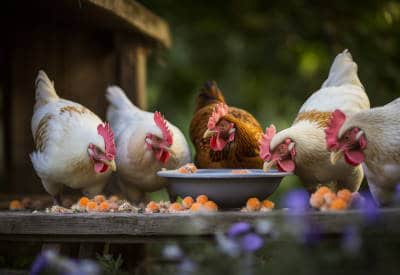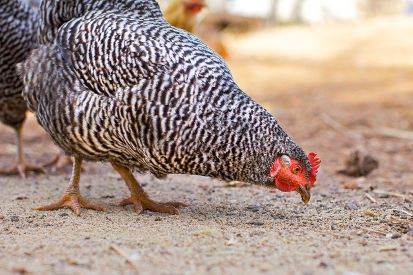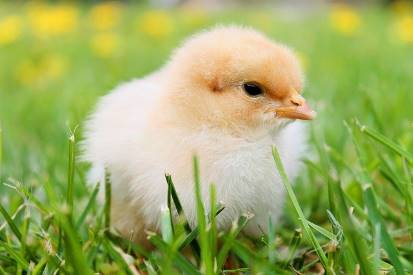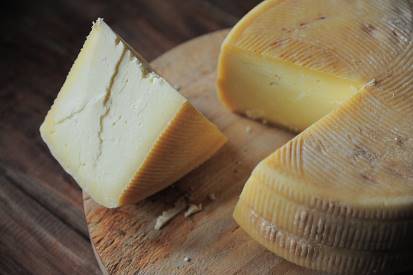As an enthusiastic backyard chicken keeper, I’ve pondered some peculiar questions. Can chickens eat yogurt seems to pop up quite frequently. After delving deep into this subject, it’s clear that the answer isn’t as straightforward as a simple yes or no.
Chickens can indeed eat yogurt, with its beneficial probiotics and essential nutrients offering several potential health benefits. But before you rush out to stock up your fridge with pots of yogurt, it’s important to note that, like all treats, it should be fed in moderation and not as a staple of your chickens’ diet.
Over the following sections, we will explore this topic in more depth, looking at the nutritional contents of yogurt, its potential benefits and risks for your feathered friends, and how to appropriately incorporate it into their diet. You can make the best decision for your backyard flock’s health and well-being with an informed approach.

Understanding Chickens’ Dietary Needs
If you’re a backyard chicken owner, you probably care deeply about what your chickens eat. After all, a healthy chicken means high-quality eggs and meat.
Basic Nutrition Requirements for Chickens
Chickens need a balanced diet for optimal health. This includes a variety of nutrients like proteins, vitamins, minerals, and carbohydrates, along with plenty of clean water. Quality poultry feed usually takes care of all these needs, but adding variety can benefit your flock.
The Role of Probiotics in Chickens’ Health
Probiotics have become a hot topic in human health, and the benefits extend to our feathered friends too. These beneficial bacteria support a healthy gut, boost the immune system, and can even improve egg production.
Common Misconceptions about Chickens’ Diet
Many people believe chickens can eat anything, but this is far from true. Chickens have a sensitive digestive system; certain foods, like chocolate and onions, can even be toxic. It’s essential to understand their dietary needs before introducing new foods.
[ChickenAffiliate]
What is Yogurt and its Nutritional Contents
Yogurt is more than just a tasty treat; it’s a powerhouse of nutrition that might benefit your chickens.
Overview of Yogurt
Yogurt is a dairy product made by fermenting milk with beneficial bacteria known as probiotics. It’s enjoyed worldwide and comes in a range of types and flavors.
The Probiotic Content of Yogurt
The star players in yogurt are the probiotics. These live cultures make yogurt and contribute to its health benefits. The most common types found in yogurt are Lactobacillus bulgaricus and Streptococcus thermophilus.
Other Essential Nutrients Found in Yogurt
Besides probiotics, yogurt is packed with proteins, vitamins, and minerals. It’s a particularly good source of calcium and Vitamin B12, which can support your chickens’ health.
Can Chickens Eat Yogurt: The Scientific Perspective

So, can you trade the chicken feed for a pot of yogurt? Well, not quite, but it could be a beneficial supplement.
Studies on Chickens Consuming Dairy Products
Research into chickens’ tolerance of dairy is sparse. However, some studies suggest that when fed in moderation, dairy products can be beneficial due to their high nutrient content.
Effects of Yogurt on Chickens’ Digestive System
Yogurt’s probiotics may help promote a healthy gut environment in chickens. The live cultures can potentially compete with harmful bacteria, offering natural protection.
Potential Health Benefits for Chickens Eating Yogurt
While more research is needed, feeding chickens yogurt could support their immune health, improve digestion, and possibly enhance egg production.
Possible Risks and Considerations when Feeding Chickens Yogurt

Like all good things, yogurt should be fed to chickens in moderation, and there are some important points to consider.
Potential Side Effects of Chickens Eating Yogurt
Too much yogurt could lead to runny droppings, which isn’t good for chicken health. Also, chickens may prefer yogurt over their regular feed, which could lead to nutritional imbalances.
Understanding Lactose Intolerance in Chickens
Birds, including chickens, have a degree of lactose intolerance, meaning they can struggle to digest the lactose in dairy products. However, much of the lactose is broken down because yogurt is fermented, potentially making it more digestible.
Precautions when Introducing Yogurt to Chickens’ Diet
Start by introducing yogurt slowly into their diet and observe their reactions. It might be best to discontinue if they show signs of discomfort or runny droppings. Also, make sure only to feed your chickens plain, unsweetened yogurt. Flavored or sweetened varieties can contain additives that aren’t good for them.
Practical Guide to Feeding Yogurt to Chickens
If you’ve decided to try yogurt, here’s how to go about it safely.
Recommended Amounts and Frequency of Feeding Yogurt to Chickens

Treat yogurt as a supplement, not a core part of your chickens’ diet. A spoonful or two per chicken a few times a week should be enough to reap the benefits without causing digestive upset.
Best Types of Yogurt for Chickens
Go for plain, unsweetened yogurt without any added flavors or sweeteners. Greek yogurt is a good choice because it’s high in protein and generally has a lower lactose content.
Creative Ways to Serve Yogurt to Chickens
You can feed yogurt directly, mix it with their regular feed, or combine it with other healthy treats like fruits and vegetables. Freezing yogurt into cubes can provide a refreshing and nutritious snack on hot days.
Other Probiotic-rich Alternatives for Chickens

If yogurt isn’t a hit with your flock, or you’re concerned about the lactose, there are plenty of other options.
Other Dairy Products Suitable for Chickens
Kefir, a fermented milk product similar to yogurt but with different probiotics, could be a suitable alternative. It’s usually more fully fermented, so the lactose content is even lower.
Non-dairy Sources of Probiotics
Probiotics are found in a variety of fermented foods. Sauerkraut, pickles, and fermented soy products like tempeh could be fed to chickens in moderation.
The Role of Fermented Feed in Chickens’ Diet
Fermented feed is another way to introduce probiotics into your chickens’ diet. It’s basically regular chicken feed soaked in water and left to ferment. The process is easy to do at home, and many chicken owners swear by the benefits.
Common Misconceptions about Yogurt and Chickens
Feeding chickens can sometimes feel like navigating a dietary minefield, and plenty of misinformation exists. One such myth centers around chickens and dairy products, including yogurt.
Chickens Can’t Eat Any Dairy Products
This misconception largely comes from the fact that birds, chickens included, are naturally lactose intolerant. However, not all dairy products are created equal. With yogurt, the fermentation process breaks down much of the lactose, meaning chickens can often digest it without issues. Always observe your chickens for any signs of discomfort, though.
Yogurt Will Spoil Quickly and Make Chickens Sick
While it’s true that yogurt, like any other food, can spoil if left out for too long, it typically lasts longer than many other foods due to its acidity. It’s important not to leave yogurt or any other food out for too long, especially in hot weather, to avoid any potential for spoilage.
Frequently Asked Questions (FAQs)

Chances are, if you’ve got a question about chickens and yogurt, someone else has probably asked it before. Here, we answer some of the most commonly asked questions.
Can Chicks Eat Yogurt?
Chicks can technically eat yogurt, but it’s not usually recommended. Chicks have delicate digestive systems and are best sticking to chick feed specifically formulated for their nutritional needs. If you introduce yogurt, do so sparingly and not before they’re at least a few weeks old.
What Happens If a Chicken Eats Too Much Yogurt?
Too much of any good thing can be bad, and that applies to chickens and yogurt. Excessive consumption could lead to diarrhea, potential nutritional imbalances, or even a preference for yogurt over their regular, balanced feed. Remember, yogurt should be a supplement, not a staple of their diet.
Can I Feed My Chickens Flavored Yogurt?
While chickens might not mind the taste of flavored yogurt, it’s not the best option. Many flavored yogurts contain high levels of sugar and artificial additives that aren’t good for your flock. Always opt for plain, unsweetened yogurt.
What Other Dairy Products Can Chickens Eat Apart from Yogurt?

Besides yogurt, several other dairy products may pique your chickens’ curiosity. Some can be fed in moderation as a treat, while others should be avoided. Let’s explore the possibilities and considerations of five popular dairy products.
Cheese
Cheese is a protein-rich food that chickens generally enjoy. However, it’s also high in fat and salt, which aren’t ideal for chickens. If you offer cheese, choose low-salt varieties and serve it sparingly as a rare treat.
Read More: Can Chickens Eat Cheese? The Surprising Answer And More
Eggs
Chickens eating eggs? Yes, indeed! Eggs are an excellent source of protein and can be very beneficial for chickens, especially those in molt or during times of stress. However, there’s a caveat: always cook the eggs first, as raw eggs can lead to a bad egg-eating habit in your flock.
Read More: Can Chickens Eat Eggs? Unscrambling The Facts
Cottage Cheese
Cottage cheese can be a good choice for chickens, as it is low in fat and high in protein. It’s softer and less salty than many other cheeses, making it easier for chickens to eat. Serve in small amounts to avoid any potential digestive issues.
Read More: Can Chickens Eat Cottage Cheese? Unraveling The Truth
Ice Cream
Ice cream might sound like a fun treat, especially on a hot day, but it’s not recommended for chickens. It’s high in sugar and can contain additives and artificial flavors. Plus, the lactose content in ice cream is much higher than in yogurt, which could cause digestive upset.
Read More: Can Chickens Eat Ice Cream? Debunking Myths & Healthy Alternatives
Sour Cream
Sour cream, like yogurt, is a fermented dairy product. While it does contain probiotics, it’s also high in fat and often contains added ingredients. If you want to feed your chickens sour cream, do so sparingly and infrequently. Always opt for a plain, unsweetened variety and observe your chickens for any discomfort or changes in their droppings.
Read More: Can Chickens Eat Sour Cream? Unraveling The Dairy Dilemma
Can chickens eat yogurt – final thoughts
So, can chickens eat yogurt? Yes, they certainly can, and they might cluck with joy while they’re at it. Packed with beneficial probiotics and essential nutrients, this creamy dairy delight could be a helpful addition to your flock’s diet. But remember, moderation is key! Think of yogurt as a tasty supplement to their usual feed, not the main event, and always watch for any signs of discomfort.
Whether Greek or traditional, remember to keep things plain and unsweetened for your feathered friends. If yogurt isn’t their cup of tea, don’t fret! There’s a whole world of probiotic-rich alternatives to explore. Keep your chickens clucking happily with a varied, balanced diet, and you’ll be rewarded with healthy, happy hens laying eggs of the highest quality.
